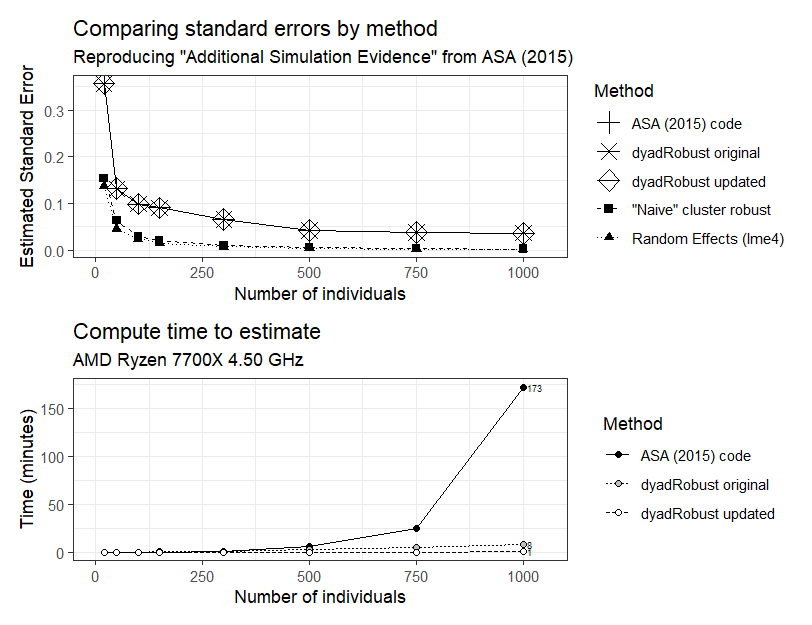This package estimates cluster-robust standard errors for dyadic data using multiway decomposition as decsribed in Aronow, Peter M., Cyrus Samii, and Valentina A. Assenova. "Cluster-robust variance estimation for dyadic data." Political Analysis 23.4 (2015): 564-577. It was developed by James Bisbee and Pedro Rodriguez
It is built on the replication materials for the same, available at https://doi.org/10.7910/DVN/OMJYE5. The value-add of this package is to dramatically reduce the computation time required to calculate these standard errors, as illustrated in the figure below.
dyadRobust can be installed from this GitHub repository with the following lines of code:
if (!require("devtools")) install.packages("devtools")
devtools::install_github("jbisbee1/dyadRobust")
library(dyadRobust)
Below is a short demonstration.
data("dyad.sim")
m <- lm(dY ~ dX,dyad.sim)
out <- dyadRobust(fit = m,
dat = dyad.sim,
dyadid = "dyads",
egoid = "dyad1",
alterid = "dyad2")
Speed can be further improved if estimating a model with fixed effects using either the feols() function from the fixest package, or the felm() function from the lfe package. Speed improvements relative to the replication code from Aronow, Samii, and Assenova (2015) are consistently ~94% across models, as demonstrated using the replication code from Fisman, Raymond, Sheena S Iyengar, Emik Kamenica and Itamar Simonson. 2006. "Gender differences in mate selection: Evidence from a speed dating experiment." Quarterly Journal of Economics 121:673–697.
To take advantage of these improvements, make sure to set the following inputs:
- `feols()`: `lean = FALSE` and `demeaned = TRUE`
- `felm()`: `keepCX = TRUE`
Examples are provided below.
require(fixest)
m <- feols(dec ~ amb + attr + intel | iid,
sdat,weights = sdat$wts,lean = F,demeaned = T)
out <- dyadRobust(fit = m,
dat = sdat,
dyadid = "dyadid",
egoid = "fid",
alterid = "mid")
require(lfe)
m <- felm(dec ~ amb + attr + intel | iid,
sdat,weights = sdat$wts,keepCX=T)
out <- dyadRobust(fit = m,
dat = sdat,
dyadid = "dyadid",
egoid = "fid",
alterid = "mid")

